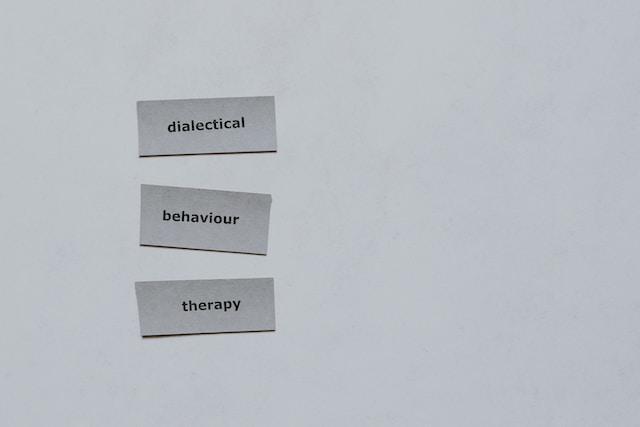Journey to Self-Discovery: DBT London's Thoughtful Therapy
Journey to Self-Discovery: DBT London's Thoughtful Therapy
Blog Article
Utilizing the Power of Dialectical Practices Treatment (DBT) Solutions for Sustainable Emotional Equilibrium and Improved Relationships
In a globe where psychological wellness and preserving healthy partnerships are crucial elements of a satisfying life, the usage of Dialectical Practices Therapy (DBT) services has actually become a sign of expect lots of people. The organized and evidence-based strategy of DBT offers a path towards lasting emotional balance and enhanced interactions with others. By focusing in on core concepts, individuals can develop important skills for managing emotions, boosting interpersonal effectiveness, and cultivating mindfulness. The true power of DBT exists not just in comprehending these principles however in the functional application of approaches in day-to-day life. As we navigate the intricacies of human emotions and partnerships, taking advantage of the possibility of DBT services becomes a transformative trip worth exploring better.
Recognizing the Core Principles of DBT
Dialectical Behavior Modification (DBT) is started upon a set of core principles that underpin its restorative method to advertising emotional equilibrium and emotional well-being. Among the essential concepts of DBT is dialectics, which emphasizes the synthesis of seemingly opposite concepts to arrive at an extra well balanced point of view. This entails recognizing and approving the oppositions and stress within oneself, resulting in a better sense of harmony and understanding. Mindfulness is another core concept of DBT, concentrating on being totally present in the minute without judgment. By cultivating mindfulness, people can establish an increased recognition of their behaviors, feelings, and ideas, enabling greater self-regulation and psychological control.
Validation is additionally indispensable to DBT, highlighting the value of recognizing and accepting one's experiences and emotions as legitimate. By incorporating these core principles into treatment, DBT uses a detailed and effective method to advertising emotional health and emotional strength.
Developing Psychological Guideline Skills
Psychological guideline abilities are essential parts of Dialectical Behavior modification (DBT) that enable individuals to successfully handle their emotions and browse tough circumstances with durability. These skills incorporate the capability to recognize and comprehend one's emotions, endure distress, manage extreme feelings, and act in accordance with individual values even in the face of emotional turmoil. Developing psychological policy skills involves discovering mindfulness strategies to stay present in the moment, understanding the triggers that result in emotional dysregulation, and executing coping techniques to modulate psychological responses.

Via DBT services, individuals can grow a deeper recognition of their emotions, recognize patterns of behavior that contribute to psychological distress, and acquire sensible tools to regulate their sensations constructively. By sharpening these skills, individuals can enhance their psychological knowledge, enhance impulse control, and foster much healthier connections. Inevitably, mastering emotional regulation causes greater psychological stability, raised self-esteem, and an increased capacity to navigate life's difficulties with calmness and adaptability.
Enhancing Interpersonal Efficiency

One secret part of enhancing social effectiveness in DBT is learning to identify and manage emotions in social communications (DBT London). By raising psychological recognition, individuals can respond to others in a much more go to the website empathetic and understanding way. In addition, DBT highlights the relevance of exercising mindfulness in social connections, encouraging people to be present in their interactions and fully involve with others

Exercising Mindfulness Techniques
Establishing a consistent mindfulness method is necessary for individuals undergoing Dialectical Behavior Therapy (DBT) to grow psychological guideline and boost their interpersonal performance. Mindfulness methods, a core part of DBT, entail taking note of the here and now minute without judgment. With mindfulness, people can end up being more conscious of their ideas, feelings, and bodily experiences, allowing them to react to scenarios with higher clearness and control.

Another essential aspect of practicing mindfulness in DBT is the principle of radical approval. Radical acceptance involves totally accepting reality as it is, also when it is hard or uncomfortable. By approving the existing minute without judgment, people can minimize their suffering and make room for favorable change.
Using DBT Methods in Life
Structure upon the structure of mindfulness techniques such as reflection and radical acceptance, individuals can integrate original site DBT methods right into their day-to-day lives to promote emotional balance and improve their interpersonal skills. Furthermore, interpersonal performance abilities instructed in DBT can help people communicate their requirements assertively, established borders, and maintain healthy connections. By consistently using these DBT techniques in everyday life, individuals can experience sustainable psychological balance and improve their total health.
Conclusion
In conclusion, utilizing the power of Dialectical Practices Therapy (DBT) services can lead to lasting psychological equilibrium and enhanced connections. DBT London. By recognizing the core concepts of DBT, establishing psychological guideline skills, improving social performance, exercising mindfulness strategies, and using DBT strategies in every day life, individuals can experience significant improvements in their overall health and partnerships. The holistic method of DBT offers valuable devices and techniques for handling feelings and developing healthier connections with others
Emotional law skills are vital components of Dialectical Habits Therapy (DBT) that make it possible for individuals to effectively manage their emotions and navigate tough circumstances with strength.Via DBT services, individuals can grow a much deeper awareness of their emotions, recognize patterns of behavior that add to emotional distress, and get useful tools to regulate their sensations constructively.Establishing a regular mindfulness technique is essential for individuals going through Dialectical Actions Treatment (DBT) to cultivate psychological policy and enhance their social efficiency.Building upon the structure of mindfulness techniques such as reflection and radical approval, individuals can integrate DBT techniques into their everyday lives to promote psychological equilibrium and improve their social abilities. By recognizing the core concepts of DBT, developing emotional guideline abilities, boosting interpersonal performance, exercising mindfulness techniques, and applying DBT strategies in daily you can look here life, individuals can experience significant enhancements in their general wellness and connections.
Report this page